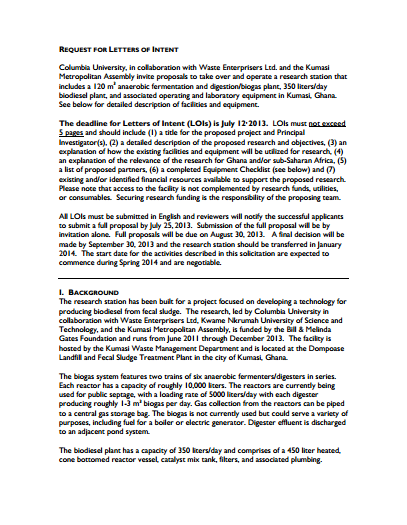Fecal sludge-fed biodiesel plants: The next-generation urban sanitation facility - Various documents on results from research grant
Chandran, K., Murray, A. (2013)

Published in: 2013
Publisher:
Kartik Chandran Laboratories at Columbia University, New York, USA
Author:
Chandran, K., Murray, A.
Uploaded by:
SuSanA secretariat
Partner profile:
common upload
6980 Views
333 Downloads
Location of library entry
This library entry contains background documents for a grant that Kartik Chandran and Ashley Murray are leading and which is funded by the Bill and Melinda Gates Foundation.
Further information and a discussion is available on the SuSanA discussion Forum, see link below.
Title of grant: Fecal Sludge-Fed Biodiesel Plants: The Next-Generation Urban Sanitation Facility
Subtitle: Creating a next-generation urban sanitation facility by transforming fecal sludge into biodiesel and methane.
Name of lead organization: Columbia University
Primary contact at lead organization: Kartik Chandran (his faculty website) and Ashley Murray
Grantee location: New York, USA
Developing country where the research is being tested: Ghana
Short description of the project:
This project focuses on the development of a resource-recovery based sanitation technology. which uses fecal sludge as a feedstock for producing biodiesel and biogas. The technology development is being conducted by a team of nine American and Ghanaian engineers based in Kumasi, with the oversight of Prof. Kartik Chandran of Columbia University. Technology development is accompanied by development of a social business model that aims to use revenue from energy products to help finance and incentivize complete and sustained urban sanitation.
Goal(s):
1) To develop a bioprocess technology based on anaerobic fermentation and digestion to convert faecal sludge into biodiesel precursors and biogas
2) To develop an associated social enterprise model that reinvests the revenues into improving sanitation for the urban poor and is widely transferrable.
Objectives (or activities or key research components):
1) Developing a bioprocess technology to convert the organic compounds present in fecal sludge to biodiesel and biogas.
2) Piloting the technology in Kumasi, Ghana at a design capacity of 10,000 L fecal sludge per day
3) Integrating the bioprocess technology component into a social enterprise business model that will further promote widespread implementation of this approach and technology across the globe.
Start and end date: May 2011 - December 2013
Grant type: Other
Funding for this research currently ongoing: yes
Research or implementation partners: Kartik Chandran Laboratories at Columbia University School of Engineering, Kwame Nkrumah University of Science and Technology (KNUST), the Kumasi Metropolitan Assembly, and the Ghanaian company Waste Enterprisers Ltd.
+++++++++++
Documents available for download below:
1 - Resource recovery from faecal sludge (presentation at FSM2 Conference in Durban, South Africa, Oct. 2012)
2 - Fecal sludge to biodiesel (Request for letters of intent, July 2013)
3 - Recovery and utilization of volatile fatty acids from organic waste for biodiesel production and microbial inactivation (presentation at FSM3 Conference in Hanoi, Vietnam, Jan. 2015 by Shashwat Vajpeyi and Kartik Chandran)
4 - Step feed anaerobic fermentation - A novel alternate for faecal sludge processing (presentation at FSM3 Conference in Hanoi, Vietnam, Jan. 2015 by Ato Fanyin-Martin, Edris Taher, Kartik Chandran)
Bibliographic information
Chandran, K., Murray, A. (2013). Fecal sludge-fed biodiesel plants: The next-generation urban sanitation facility - Various documents on results from research grant. Kartik Chandran Laboratories at Columbia University, New York, USA
Filter tags
English Faecal sludge treatment processes Fundamental research and engineering North America Sub-Saharan Africa















